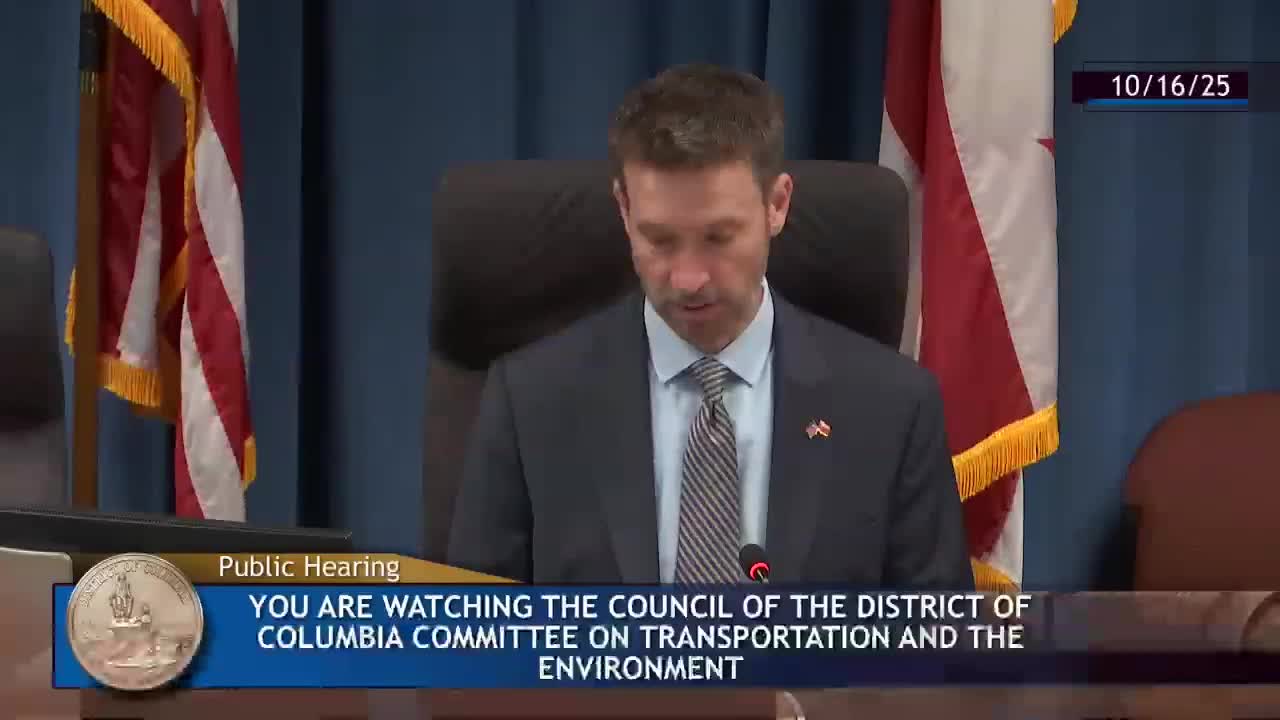Businesses and tech firms urge automated curbside program; DDOT warns procurement, timeline and revenue rules need work
Get AI-powered insights, summaries, and transcripts
Subscribe
Summary
At an Oct. 16 hearing the Committee on Transportation and the Environment considered a bill requiring DDOT to build an automated curbside management system and a smart loading‑zone program. Private firms and business groups cited traffic and double‑parking reductions; DDOT said mandated procurement timelines and funding language should be revised.
Councilmember Charles Allen told the committee on Oct. 16 that the Automated Curbside Management System Amendment Act of 2025 would require DDOT to establish a system that uses cameras, sensors or other technology to collect real‑time curbside data, bill drivers for curb use and automatically detect violations. The bill would also require a focused smart loading zone program to manage pick‑up, drop‑off and loading spaces.
Private providers and cities that have adopted similar systems told the committee the technology can substantially reduce double parking and improve delivery efficiency. Jordan Justice, chief executive officer of Automotus, said smart loading zones in other cities sharply reduced double parking and increased turnover: he cited Pittsburgh (a nearly complete elimination of double parking in the downtown program), Philadelphia (about a 52% reduction in traffic in some peak areas) and Hoboken (a 71% reduction in double parking in protected lanes after launch).
Gabe Klein, an Automotus board member and former DDOT director, framed the technology as ‘‘AI for good’’ that can ease workloads for parking enforcement officers and raise curb turnover. He said dynamic pricing and automated billing make it possible for businesses and delivery fleets to pay for actual curb use instead of relying on fines or circling for parking.
Business users raised practical concerns. Risa Herrao, president of the D.C. Association of Beverage Alcohol Wholesalers, told the committee wholesalers need loading zones sized for box trucks and time to work with DDOT on location selection, and worried that the bill's language could be read to repeal existing commercial loading zones; Chair Allen clarified the legislation does not repeal the current program. Herrao also asked how automated enforcement would address illegally parked cars that physically block a loading zone.
DDOT's view: Director Sharon Kirschbaum told the committee DDOT has studied automated curb management and issued a request for information in 2024. She said the agency supports the goal but had three primary concerns with the bill as drafted: (1) it does not clearly permit a revenue‑sharing/franchise structure that would allow a vendor to finance implementation in exchange for a portion of collected fees, (2) its procurement and operational timelines — 90 days to write regulations and six months to begin operations — are unrealistic given current budget and procurement processes, and (3) the bill's procurement priorities are overly prescriptive while the market offers many configurable options.
Implementation questions: witnesses and members discussed pilot geography, inventory of loading zones, the need to preserve spaces sized for commercial trucks, how dynamic pricing could be used to increase turnover and prevent long‑term parking, reciprocity for out‑of‑state plates and privacy questions tied to automated license plate readers. DDOT said the agency prefers to define rates and operational details in procurement and regulation and to pursue any pilot or phased deployment in denser commercial corridors where curb demand is concentrated.
Ending note: the committee left the record open for written testimony through Oct. 30. DDOT urged the Council to refine procurement authority, timelines and funding language so the agency could operationalize a system without taking on large upfront capital obligations.
